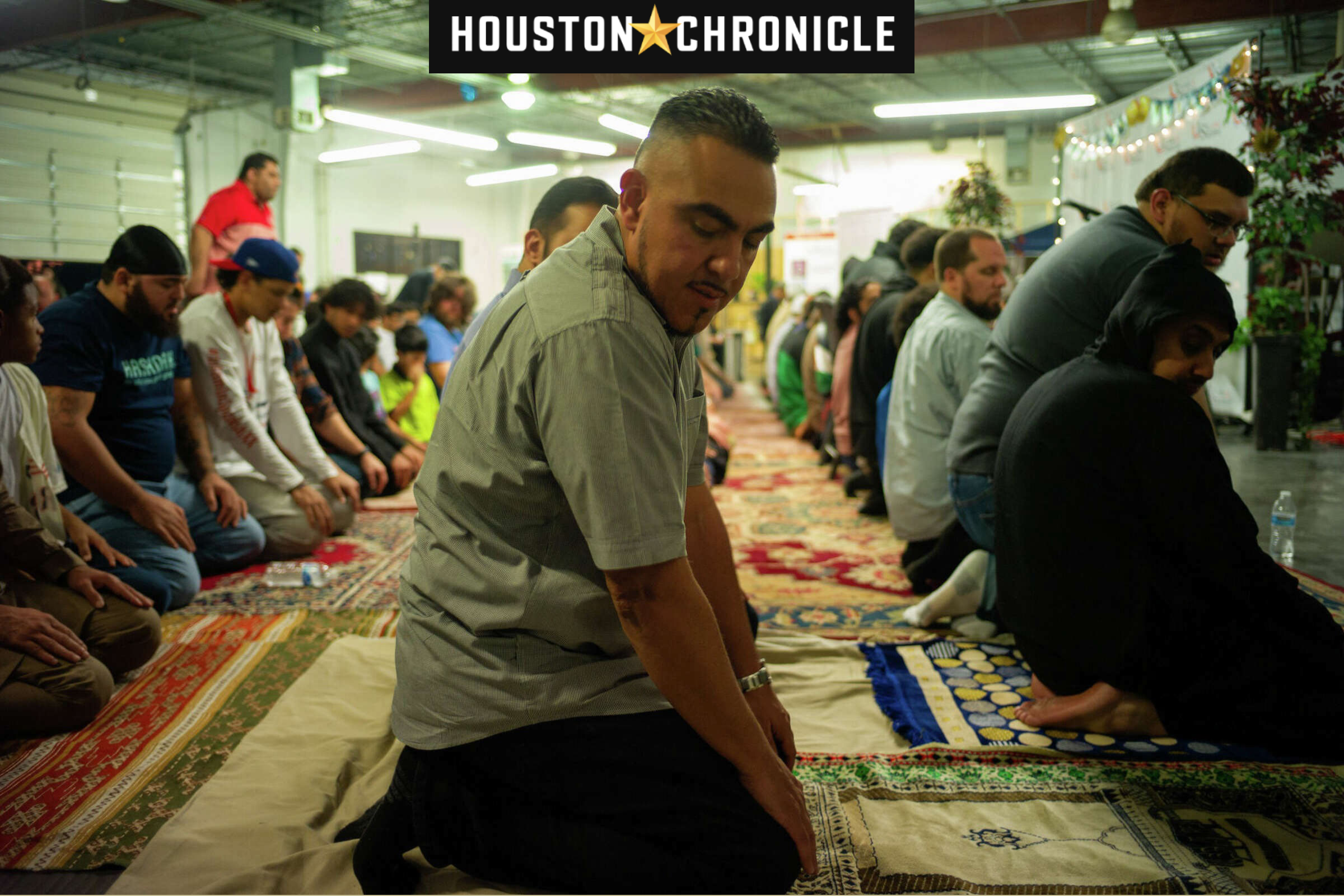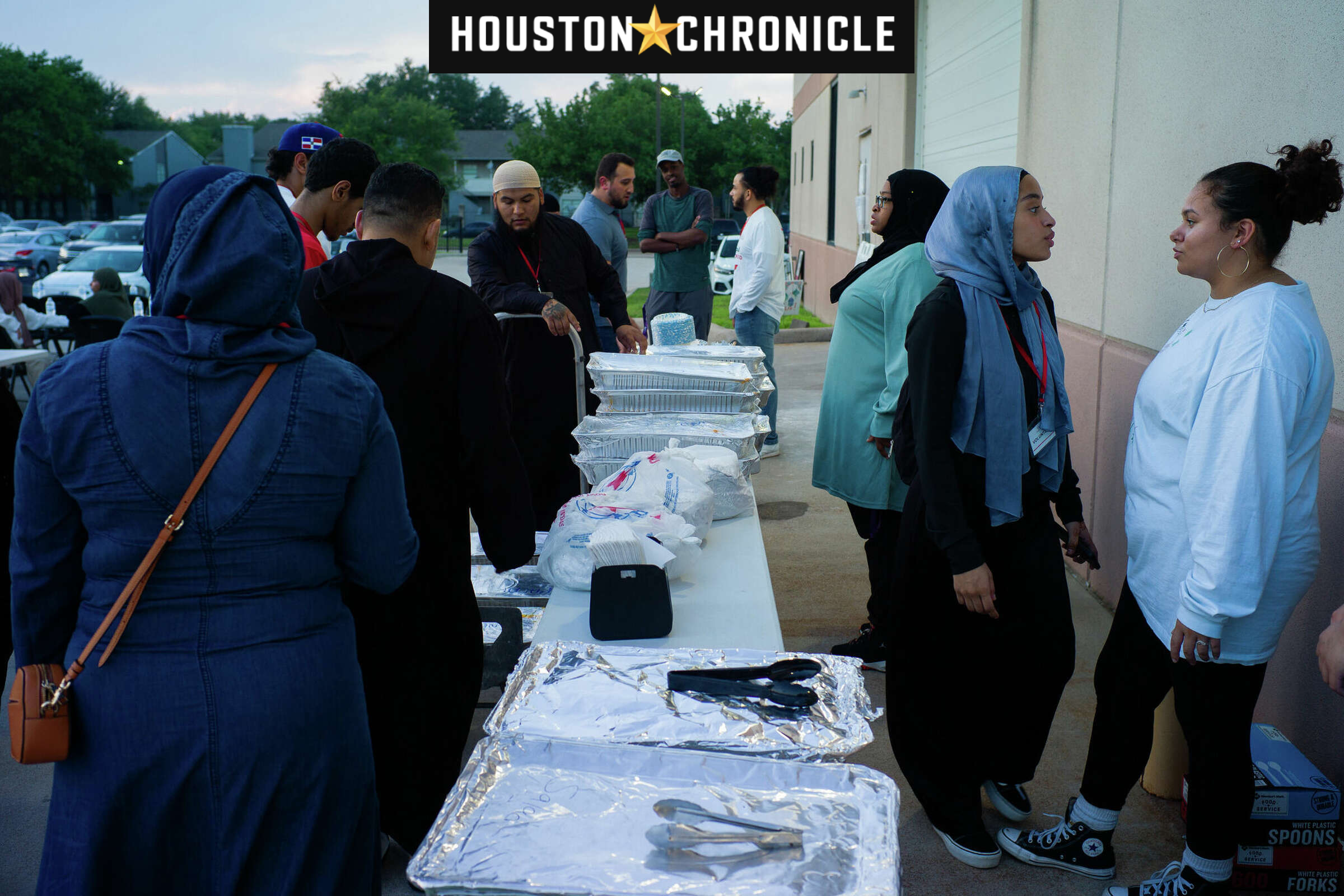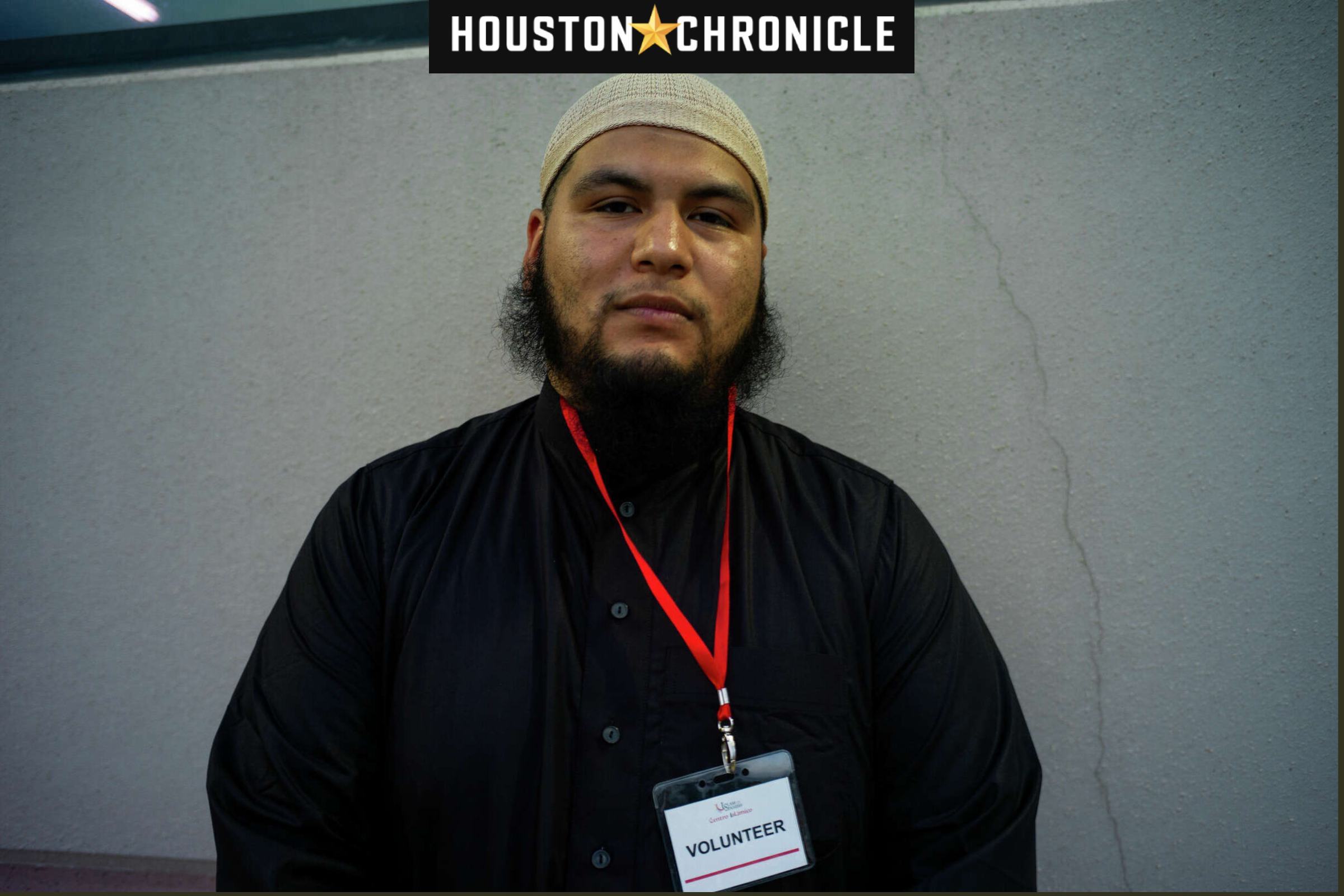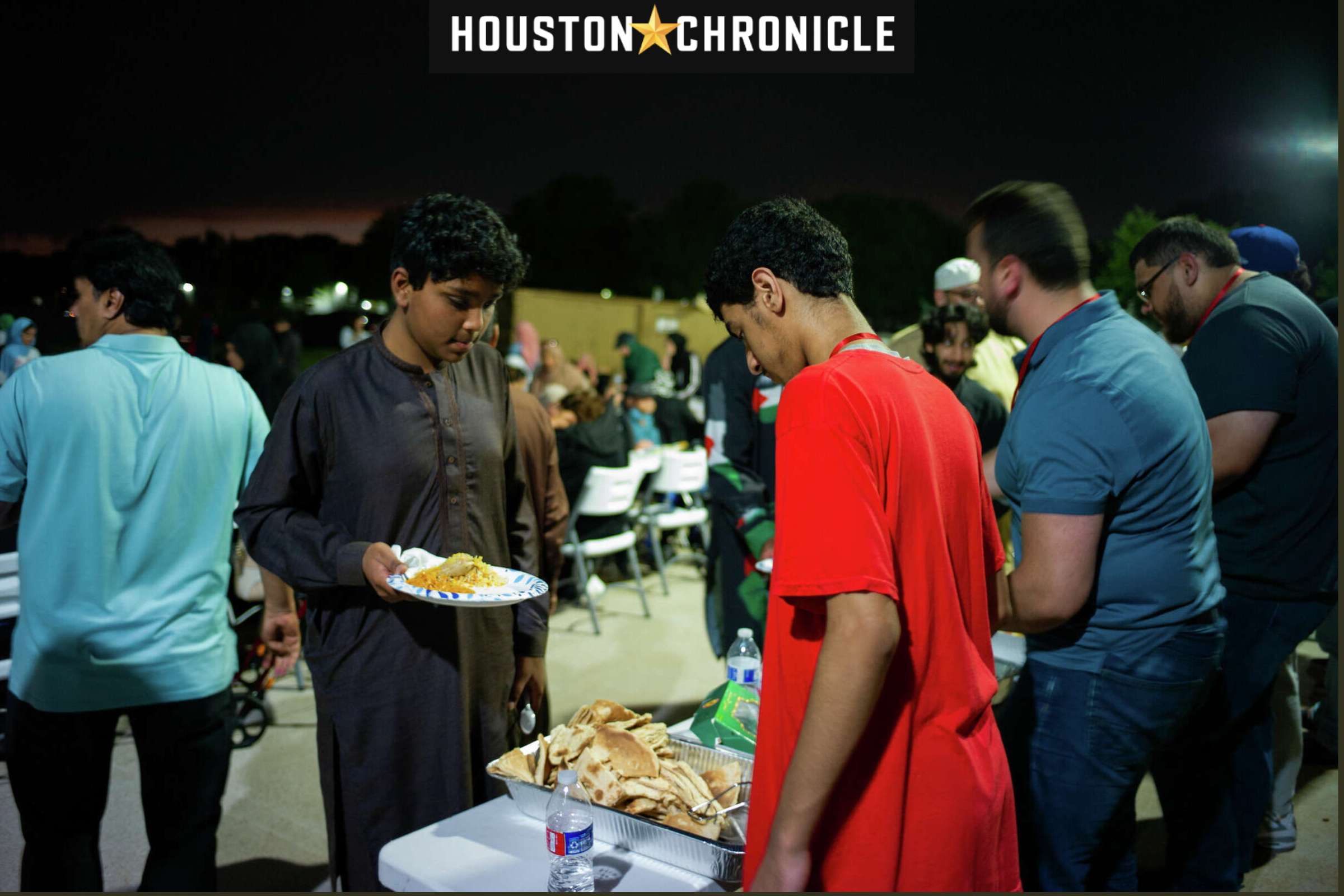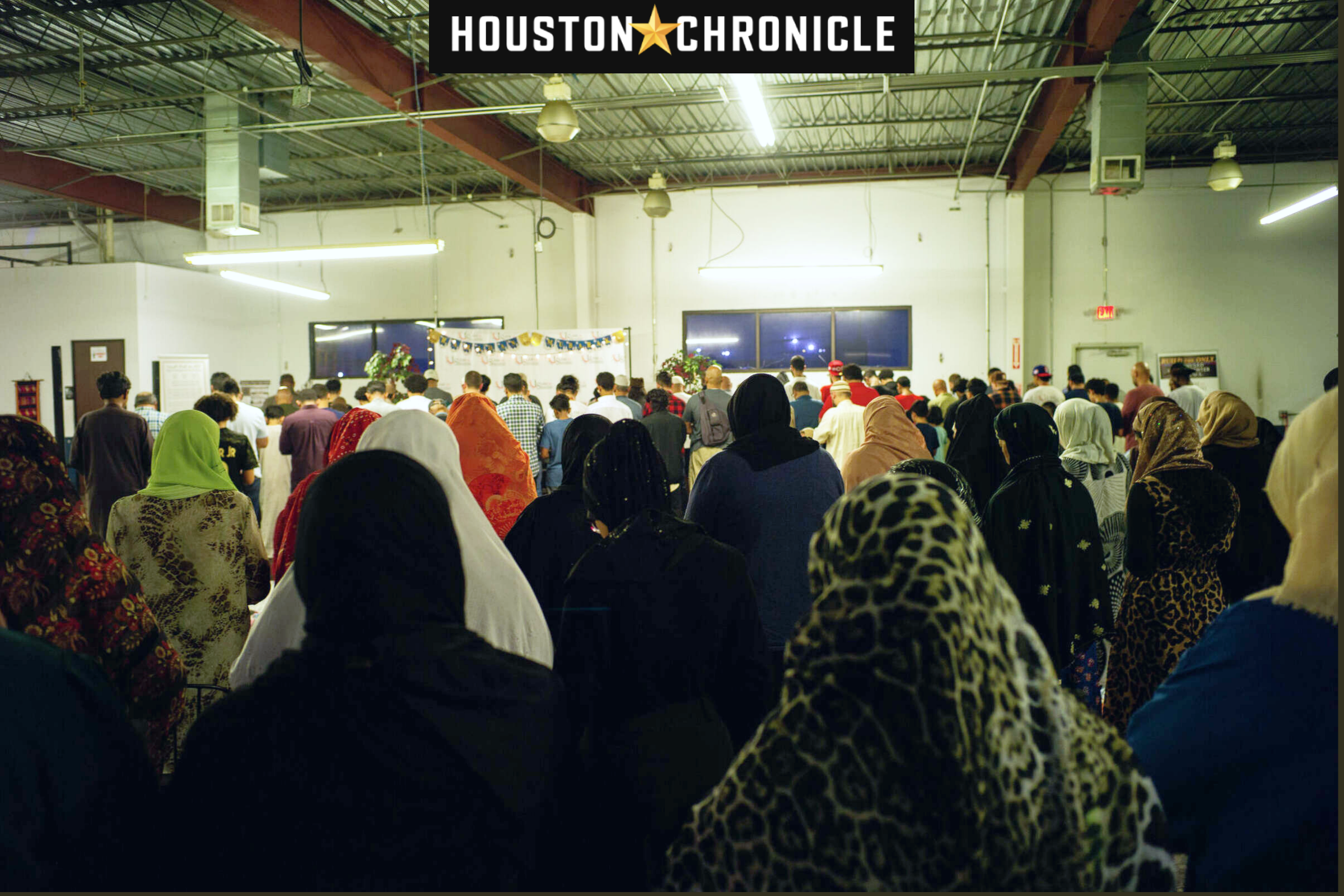Houston Chronicle: At Houston’s Latino-led mosque, an increasingly multicultural city is on display
IslamInSpanish’s founder, Mujahid Fletcher, prays among others in Houston, Saturday, April 15, 2023. Fletcher founded the center to educate Latinos about the religion.
Joe Robles/Contributor
As the sun set Saturday night over Alief, Jaime “Mujahid” Fletcher broke his Ramadan fast reflecting on how much his mosque has grown.
Founded two decades ago by the native Colombian and former Catholic, IslamInSpanish Centro Islamico is now a leading organization for a growing community of Houston-area Latino Muslims who lacked resources about the religion in their language.
The center’s mostly Latino devotees now include Muslims from all over the world and it has emerged as one of the most prominent Spanish-speaking mosques in the country.
“Celebrating our common humanity leads to what we’re seeing here,” Fletcher said. “We wanted to set up a place where people, Muslim or not, could come and feel welcome regardless.”
The mosque is appealing because of how it blends Latino culture with Islamic traditions, said Rafe Biswas, a 36-year-old Houstonian of Bangladeshi descent.
Biswas, a professor at the University of Texas at Tyler’s Houston Engineering Center, has been living in Houston for a decade and said he has not found a mosque as welcoming as IslamInSpanish.
“My friends ask me why I would go here, and I tell them that it’s meant to be a place for all Muslims,” he said.
Volunteers prepare to serve food to IslamInSpanish devotees in Houston, Saturday, April 15, 2023. IslamInSpanish volunteers arrived early to set up the tables and prepare food for the gathering.
Joe Robles/Contributor
The mosque is a leader in a growing trend nationally. Across the country, 7% of Muslims identified as Latino in 2018, up from just 1% in 2009, according to the Institute for Social Policy and Understanding, a Washington-based advocacy group. The Pew Research Center says the number of Muslims living in the U.S. increased to 3.5 million in 2017, up from 2.5 million a decade earlier. Roughly a quarter-million of them are Latinos, according to Pew.
The Houston-area mosque is unique in how men and women pray together, an unconventional practice in Islam but similar to the Christian backgrounds that many of IslamInSpanish’s converts come from.
Women of the IslamInSpanish congregation pray the Maghrib prayer in Houston, Saturday, April 15, 2023. Maghrib is the prayer immediately following the breaking of fast during Ramadan.
Joe Robles/Contributor
And the food, Biswas added.
Most community dinners at the mosque are potluck-style meals, so Latin American staples such as flautas, empanadas and tres leches cake are common.
Foods from other cultures are also showcased at the events, as was the case Saturday night when a Pakistani couple brought butter chicken, basmati rice and naan.
Even as IslamInSpanish becomes more multicultural, with faithful coming from everywhere from Jamaica to Japan, the mosque has continued to be a refuge for Latino converts to the religion, Fletcher said.
Will Perdomo, a 23-year-old from Alief who is studying to become a teacher, has studied Islam for a year and converted a few weeks ago at the beginning of Ramadan, the Muslim holy month.
“When I pray, I feel closer,” he said of his conversion through IslamInSpanish. “It’s like, ‘Hey, God, it’s me finally.’”
Ana Ortiz stands in front of the Ramadan closet at IslamInSpanish in Houston, Saturday, April 15, 2023. Ortiz, along with others, gathers clothing donations to provide to members of the congregation who need them for Eid.
Joe Robles/Contributor
The organization sponsors a clothing giveaway for recent converts who don’t always have proper attire for celebrations such as Eid, which marks the end of Ramadan.
For Johnny Lopez, who converted nearly two years ago, IslamInSpanish has provided the stability he’s longed for since he was a child growing up in north Houston.
The 25-year-old said he was surrounded by gang culture in his youth, and he began studying Islam after his son was born. He and his wife, originally Christians, eventually converted to Islam after their child’s birth.
“I was raised around a lot of negativity,” Lopez said. “This has given me a bigger family.”
IslamInSpanish volunteer Johnny Lopez in Houston, Saturday, April 15, 2023.
Joe Robles/Contributor
Others, such as Jessica Disla, have come from across the country to join IslamInSpanish.
Disla, 43, grew up in the Dominican Republic and later settled in New York City’s Washington Heights neighborhood, which is predominantly Latino.
After converting three years ago, Disla said she was disillusioned by difficulties she experienced as a Latina Muslim in New York, such as the lack of community.
A trip to Houston during Ramadan in 2021 convinced her to move her family to Texas.
“When I got here, it sort of felt like visiting family,” said Disla, who is now the mosque’s administrator. “Instead of it feeling like a strange place, it was like walking into a cousin’s house for a family reunion.”
Volunteers serve food at an IslamInSpanish community iftar gathering in Houston, Saturday, April 15, 2023. Iftar is the evening meal to break fast during Ramadan.
Joe Robles/Contributor
Islam resonates with many Latinos because of a shared cultural past rooted in centuries of Muslim rule over what is now Spain between the eighth and 15th centuries, Fletcher said. Many Arabs immigrated to parts of countries like Colombia and Mexico after they won independence from Spain in the 1800s, spreading their religion as well, he added.
He plans to pay tribute to those roots with a museum inside IslamInSpanish’s 10,000-square-foot facility, which is an upgrade from the bank-turned-mosque the center used to reside in. Fletcher also hopes to remodel the building to resemble traditional Islamic architecture from Spain and the Middle East.
“(IslamInSpanish) is almost like a social experiment for what many of us and our ancestors wish would come back,” he said.
Mohammed Ali recites a call to pray in Houston, Saturday, April 15, 2023. Renovations occurring inside of IslamInSpanish are visible.
Joe Robles/Contributor
Samina Malik, from Pakistan, has seen IslamInSpanish grow from a small educational nonprofit founded in the early 2000s to its current facility right under the Alief water tower where hundreds can now gather.
Like Biswas, she and her family have visited multiple mosques throughout Houston but haven’t found a fit quite like this one.
“It’s the people,” she said of IslamInSpanish. “They make you feel like you’re part of this community.”
jhair.romero@houstonchronicle.com - Original Article
The IslamInSpanish faithful gather for Maghrib in Houston, Saturday, April 15, 2023. Maghrib is the prayer immediately following the breaking of fast during Ramadan.
Joe Robles/Contributor

